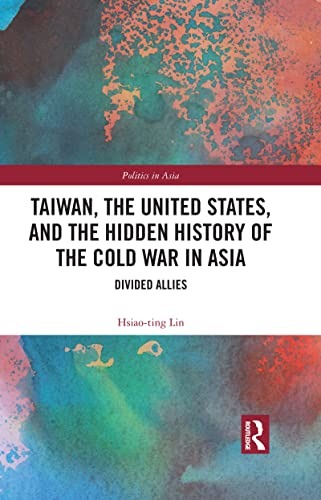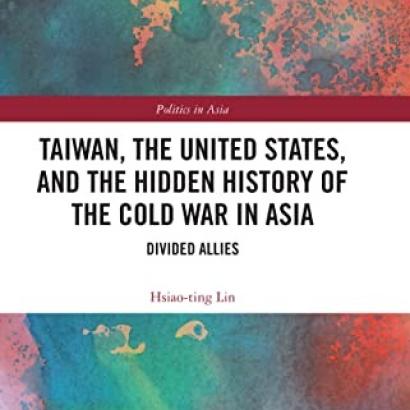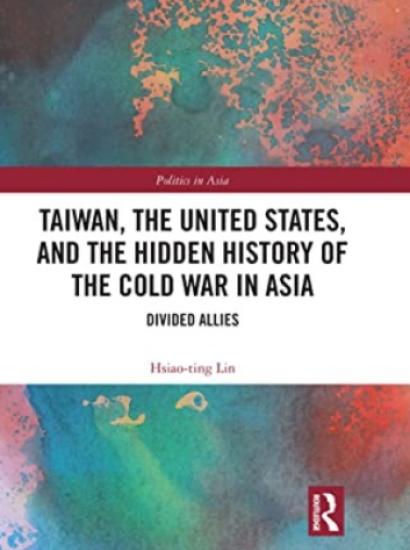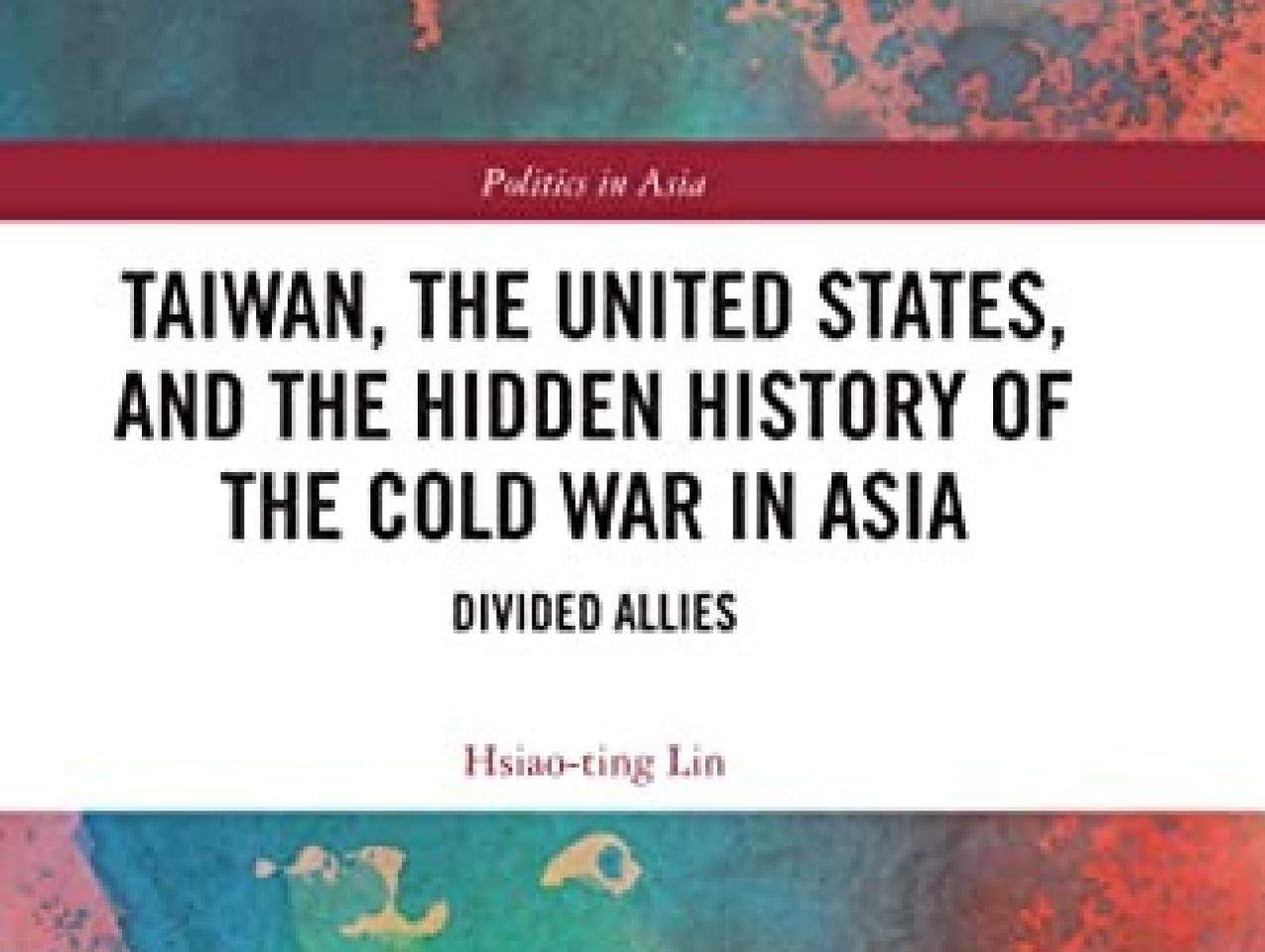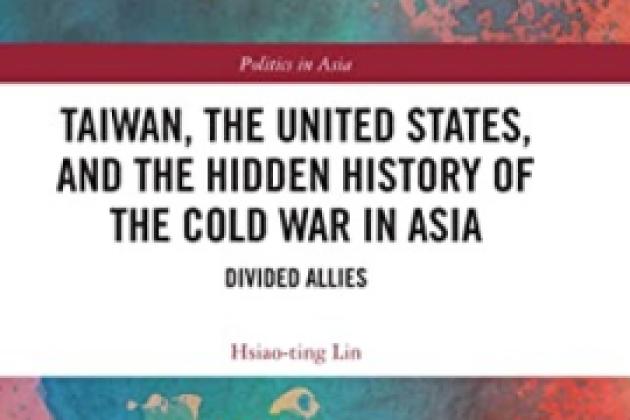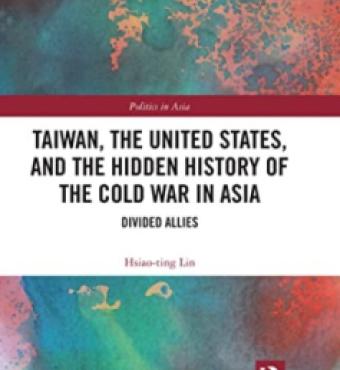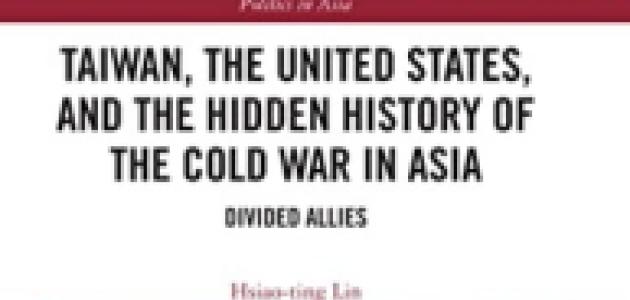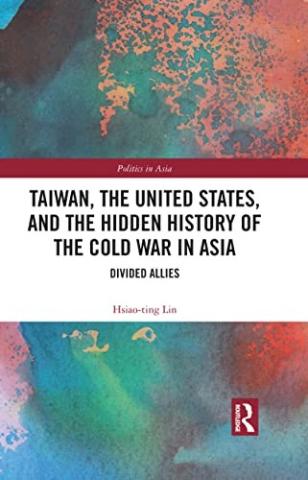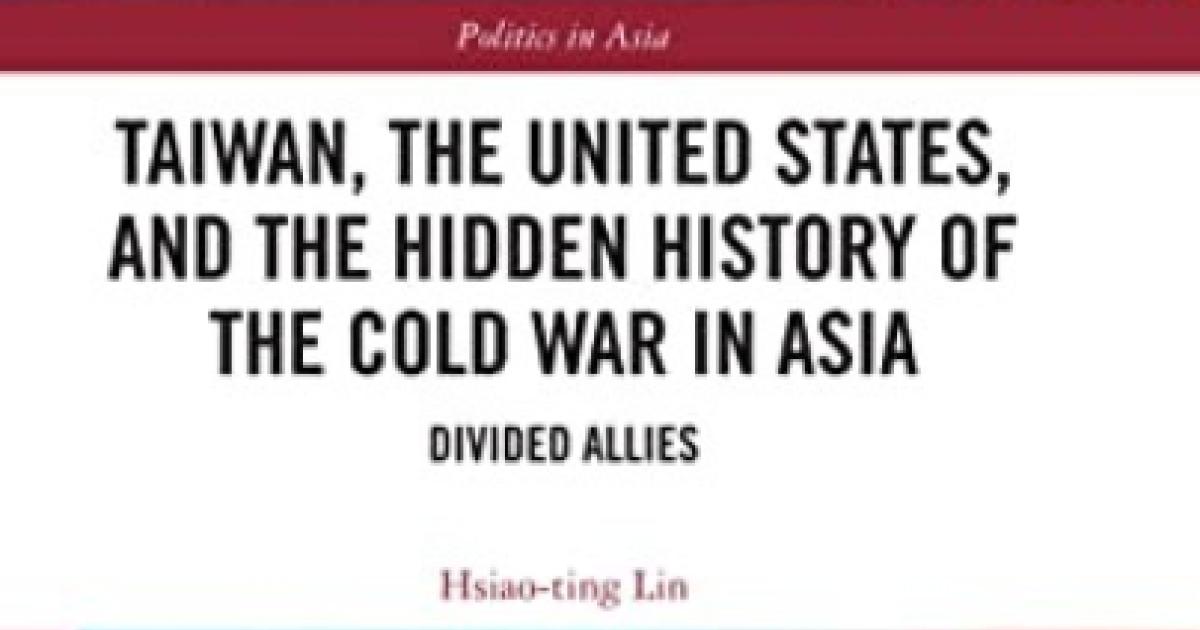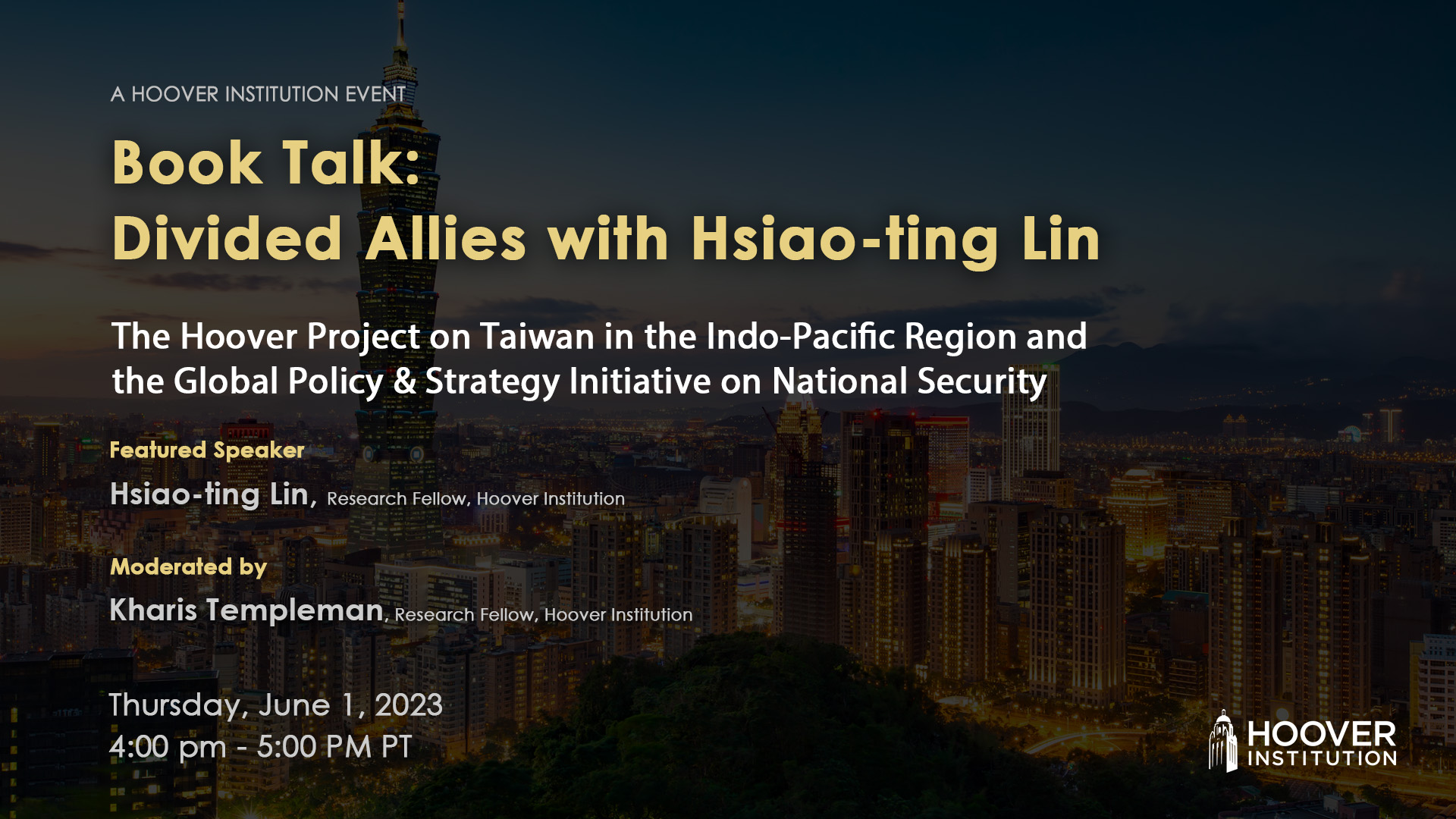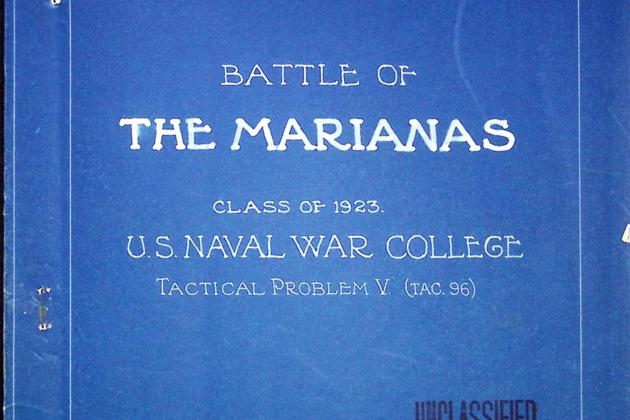On behalf of Taiwan in the Indo-Pacific Region and the Global Policy & Strategy Initiative on National Security, the Hoover Institution held a book talk: Divided Allies with Hsiao-ting Lin on Thursday, June 1, 2023, from 4:00 - 5:00 PM PT.
Professor Lin’s book explores the challenges which faced the United States and Taiwanese alliance during the Cold War, addressing a wide range of events and influences of the period between the 1950s and 1970s. Tackling seven main topics to outline the fluctuations of the U.S.–Taiwan relationship, this volume highlights the impact of the mainland counteroffensive, the offshore islands, Tibet, Taiwan’s secret operations in Asia, Taiwan’s Soviet and nuclear gambits, Chinese representation in the United Nations, and the Vietnam War. Utilizing multinational archival research, particularly the newly available materials from Taiwan and the United States, it reevaluates Taiwan’s foreign policy during the Cold War, revealing a pragmatic and opportunistic foreign policy disguised in nationalistic rhetoric.
>> Kharis Templeman: Well, good afternoon to everyone joining us today. I am Kharis Templeman. I am the project manager of the project on Taiwan in the Indo Pacific region here at the Hoover Institution. And it's my great pleasure today to have joining me, my friend and colleague, Hsiao-ting Lin, who is a research fellow and curator of the modern China collection here at the Hoover Institution.
He joins us today from his secret, undisclosed location somewhere in the vicinity of Hoover Tower to talk about his new book, which just came out last year. And it's entitled Taiwan, the United States, and the Hidden History of the Cold War in Asia, Divided Allies. Now, I imagine some of our audience already knows that the Hoover institution has a substantial library and archives that includes a significant collection of Taiwan related materials.
Including some KMT party documents from the early Cold War era, a number of private personal collections. And probably most well known is the Chiang Kai-shek and Chiang Ching-kuo diaries, which are in the position the possession of the Hoover institution. Hsiao-ting has taken advantage of access to those documents to cover the topic of US-Taiwan relations during the early and into the middle of the Cold War era.
The book itself, it explores the challenges of the United States and the Taiwanese alliance during the Cold War, and it covers seven main topics. And so we're gonna hear from Hsiao-ting today about some of those topics. And I'm really looking forward to this cuz there's some, I think, underappreciated or in some cases even unknown details about the kind of what he calls the hidden history of this relationship.
And given that we're in a time of growing US-Taiwan cooperation in the security space and more broadly, some of the lessons from this period actually are very pertinent for today's US-Taiwan relationship as well. So I'll stop droning on, I'll go ahead and turn over the floor to Hsaio-ting here.
And I just want to invite our audience, you'll note at the bottom, there is a place to submit questions in the Q and A box. We'll go until five. We'll have a little bit of time at the end of this talk to raise some questions for our speaker.
So if you do have a question during the talk, I invite you to pose it there. I can't promise we'll get to it, but I encourage you to raise any questions you have there. All right, without further ado, Hsaio-ting, the floor is yours.
>> Hsiao-ting Lin: Thank you, Kharis. Thank you, everyone who joined this talk.
Please let me share my PowerPoint slide with all of you. So it is my great honor to introduce my new book to all of you. For decades, there has been a tendency in western scholarship to underscore the negative side of US-Taiwan relations, placing emphasis on conflicts within the alliance and the unattractive aspect of the Kuomintang government.
For example, Chiang Kai-shek had tried to maneuver the United States into conflict with the PRC and undermine US efforts to reduce tension with Beijing, as exemplified by the offshore island crisis of the 1950s. Scholars also argue how American ties with the Kuomintang created problems for the United States among friendly and allied countries in Asia and in Europe, leaving many to feel the US government only promote the alliance because of its anti-communist crusade.
Well, this book does not entirely discard the above arguments. Indeed, I think no policy is without cost, difficulties, and risks. And certainly, America's partnership with the Chinese nationalists on Taiwan was fraught with these negative elements. In this book, I try to explain and reevaluate the various components of the US-Taiwan alignment, with a special focus on the Chinese nationalists and their calculating, sometimes recalcitrant perspectives on and perceptions towards the bipartite relationship.
This book explores seven subjects, as Kharis just mentioned, including the offshore islands, the mainland counterattack, Tibet, Taiwan's secret operation in Asia, the United Nations and the Vietnam War, and finally the Soviet and the nuclear gambits. Why are these stories worth being told or retold? Because these stories illustrate the secrecy and enmity at work behind the ideologically propelled anti-communist alliance across the Pacific.
They also present divergent leadership perceptions towards key issues during the Cold War. The first chapter revisits issues surrounding the offshore island crisis. Well, I believe this is a subject most of you are all too familiar with. The photo on the right-hand side shows Chiang Kai-shek and his son, Chiang Ching-kuo, inspecting Kuimoi only 48 hours before the PLA began to bomb the island.
But in this book I offer some previously unknown insights into the offshore island issues. For example, in the early 1950s, when the CIA began to provide Chiang Tai-shek with ammunition to infiltrate and sabotage PRC infrastructure along China's coastal areas. Top intelligence chiefs in Washington, DC were totally unaware that Taipei had actually shared CIA's ultra secret information on these guerrilla operations with the Japanese, who Chiang Tai-shek simultaneously recruited to help train his military forces on Taiwan.
So you can see on these two photo slides, these are historical materials from Hoover archives indicating the CIA deployment of the troops along the offshore islands. And the Japanese were actually, they had all the details about this deployment. The Baituan, which means the white group, was led by a former Japanese imperial army officer.
So in the nearly two decades of Baituan's existence in Taiwan, more than 10,000 Taiwan's high ranking military officers had attended its training program. As you can see from the Baituan materials now available here at Hoover, the Japanese even began to supply Taiwan guerrilla units with munitions before the signing of the 1952 San Francisco peace treaty, before Japan finally regained its sovereignty.
Another hidden story of the offshore island crisis was the secret contact between the Kuomintang and the Chinese Communist Party. Details can be found in my book about how and why such a secret contact across the Taiwan Strait began to appear around mid 1950s. At any rate, at the height of the 1955 Kuimoi crisis, Beijing conveyed multiple messages to Taipei through an old acquaintance of Jiang Jing-kuo in Hong Kong, whose Name is Cao Juren.
The photo shows the letter sent to top Guomindang figures in Taipei by Mister Cao in Hong Kong at the height of the Kui Moe crisis. So on the left hand side, you can see Mister Cao, he was a handsome guy. So the message Beijing instruct Minister Cao to convey to Taipei include number one, if Chang Kaishi no longer depends on the US military protection, Beijing promised it would not attack Taiwan.
Number two, Beijing proposed the evacuation of Kuomintang troops from the offshore islands so as to create a demilitarized Guemoe and Matu. And then to transform these two island groups into free economic zones. Number three, the opening of direct port to port shipping lines across the Taiwan Strait. Number four, Kuomintang and the Chinese communists resumed peace negotiations to discuss the reunification.
In order to win Taipei's confidence, mister Cao even gave Taipei an advanced notice about the specific date when the communists would stop bombing Hemoy. So as to facilitate the resupply of Taiwanese troops on the island. Well, on the other hand, when Americans became aware of the secret contact, they immediately demanded that Ku Ming hand over copies of these letters.
There was no way the Eisenhower administration would allow a cross trade peace overture to happen. At the moment when the us government implemented a policy of contentment against world communism. The American pressure on Taipei grew to such an extent that Chiang Kai shek had to hold a news conference.
To clarify that his government would never open negotiations with the Chinese communists. You can see on the right hand side. So the 1958 crisis came to an end, not only as a result of US pressure on Chiang Kai share, to declare an end to his goal of military recovery of the mainland.
As what we have learned from the previous scholarship. But also because of the Chinese communists who decided that a continued Kuomintang presence on these offshore islands would best serve their interests. And to avoid the so called two Chinas or one China, one Taiwan scenario. It is noteworthy that the secret message delivery across the strait continued into the 1960s.
For example, in April 1960, CIA warned Taipei that, according to reliable intelligence, the Chinese communists were likely to attack the offshore islands. Before Chiang Kaizhe inaugurated for the third term in May. Then Cao Jiren assured Taipei on behalf of Beijing that there was no such a plan. Later in July, the same year, when the Peoples Liberation army bombed Kuimoe to protest President Aisenhouse visit to Taiwan.
It took Taojirens secret message again to assure Taipei that Beijing did not intend to reverse its current stance and to occupy the island. Well, chapter two discussed the mainland counterattack during the Cold War. Again, I think this is a topic I believe most of you are very familiar with.
For several decades after 1949, reclaiming the mainland, or what we say reclaiming the mainland was Kuomintang's top national goal. And it was deeply penetrating into the daily life of Taiwanese society. The ultimate recovery of the mainland was also closely embedded into Taiwan's political, cultural, and educational agenda, as well as social mobilization and party organization.
But I try to reconsider the following questions. Number one, who really needed mainland counterattack and why? To put it in a nutshell, during the Korean war, it was the US government that several times urged Taipei to counterattack with a view to relieving us pressure on the Korean peninsula.
Washington was willing to support Chiang Kai's force to retake South China and Hainan island as a way to distract the Chinese communists. It is totally understandable. And it was also during the time that a lot of Chiang Kai's former military and intelligence chiefs within and outside Taiwan. Zealously requested new assignment and resources to make sure they would not be excluded from this wave of counterattack fever.
In other words, I argue that the so called a counterattack became a very lucrative business for many politicians and military figures. But Chang Kai refused to comply because he saw no advantage in taking such a military operation. Then, after the ceasefire of the Korean war, it was Chung who began to worry that Taiwan's strategic importance would decline and began to advocate loudly the necessity of mainland counterattack.
And there was the fourth player, key player in this counterattack game. It was Chiang Ching-kuo, who had never been a core member in the Kuomintang military hierarchy. Throughout the 1950s and early 1960s, the Xiaojiang, the younger Jiang enthusiastically supported his fathers policy of mainland counter offensive. At the moment when many of Chiang Kaishis military chiefs thought it a crazy idea.
To be a strong advocate of the mainland recovery would allow Chiang Ching-kuo to gain more weight in the military policy, planning and decision making circle. So starting from the late 1950s, you can see Chiang Ching-kuo was playing a very, very large role in many, many crucial military activities and planning.
Including a special operation during which Chiang Taishi intended to throw in thousands of special forces to invade Yunnan in southwest China. On the left hand side, you can see Chiang Ching-kuo joined his father and other top military leaders in reviewing the exercise. On the right hand side, you see Chiang Ching-kuo inspect Kuomintang's military forces on the border of China and Myanmar on the Yunnan and Burma border.
So what I want to emphasize is that the concept and proposal of counterattack and the resulting military and social mobilization were deeply entangled with Taiwan's domestic power struggle. It was especially so when Zhang decided to break the constitutional rule and continue the presidency in 1960, as political crisis was looming large surrounding the debate over Chiang's re election.
Then Fangong Dalu had become a very useful and powerful agenda to thwart any possible attempt to challenge Chiang's leadership status. So interesting, and yet, ironically, when Chiang Ching-kuo became Taiwan's defense minister and was eventually a key decision maker in Taiwan's military. His attitudes towards Faigo Dalu dramatically changed.
Unlike his aging father, he now no longer believed the goal was feasible if no support could be obtained from the United States, so more details can be found in my book. So chapter three focused on Tibet. A piece of ethnic territory where the nationalist government insists as part of the ROC territory, and where it had never really effectively ruled before 1949.
So after the Kuomintang regime moved to Taipei in its constitution, Tibet, and together with Mongolia, remained a part of the ROC territory. By the mid 1950s, the unrest in the ethnic Tibetan area provided the Americans with opportunity to use the Tibetans as a platform for anti communist activities.
As these two photos show, the CIA began to train Tibetan guerrillas in secret bases on the Saipan island and in Colorado. So the purpose was to airdrop these guerrillas back to infiltrate Tibet and establish anti communist power bases. So in the meantime, Taiwan also seized the unrest in Tibet to connect with anti communist forces in eastern Tibet and to provide them with military supplies and trainings.
Chiang Kai-shek and Chiang Ching-kuo apparently viewed Tibet as a potential target area where they could advance their anti communist cause. So these two photos suggest that Taiwan was in direct contact with Gushi Kendrick. Literally means, four rivers, six ranges, a powerful combat Tibetan guerrilla force in Eastern Tibet.
Taiwan also launched a secret program to train dozens of ethnic Tibetan youth to be dispatched into the Tibetan area for anti communist movement. So then, in March 1959, I think most of you all know, the riot broke out in Lhasa, and with the assistance of the CIA, trained Tibetan guerrillas, the Dalai Lama left Tibet and sought asylum in India.
When Chiang Kai-shek urged the United States to take joint action in supporting Tibet's anti communist cause, the US government informed him that it was none of Taiwan's business. Because the Tibetans were apprehensive towards the Han Chinese on both sides of the Taiwan Strait, the US government would move forward with its own tibetan agenda, free from Taipei's intervention.
Well, you can imagine Chiang Kai-shek was very, very mad. So in the following month, a smokeless war on the diplomatic front took place between Taiwan and the United States. The US government was determined to internationalize the Tibetan issue at the moment when Taipei insisted that the issue was entirely a domestic one.
So when the Tibetan government in exile was created, Taipei was extremely anxious whether the United States would recognize it as an independent government. When the Dalai Lama officially appealed to the United nations for support, Taipei found itself in an extremely awkward position. Namely, it needed to show its support for the Tibetan anti communist cause.
But if the United nations recognized Tibet's independence, then Kuomintang's political legitimacy and its fictional territorial clan over Tibet would be shattered. So while the US government was busy lining up possible sponsors for Tibetan independence, at the United Nations. Chiang Kai-shek officials were also busy reaching out to Taipei's allies to prevent them from taking the lead in sponsoring the Tibet question in the United nations.
Meanwhile, the communist bloc denounced Washington for launching an evil campaign against the Chinese people and their government. So in the end, the majority of UN member states only support the humanitarian aspect of the Tibetan issue while avoiding to touch on the legal status of Tibet. And then Taipei was relieved and much to America's displeasure, Chiang Kai shek reaffirmed Chinese sovereignty over Tibet, arguing that any change in Tibet status was impossible unless the CCP, the communist, was overthrown.
So regardless of US attitudes, Taipei was determined to go along with its debated agenda. You can see these photos. In October 1959, in the double tense day, Chiang Kai shek received a group of dependent guerrilla forces and their families in Taipei as a way to demonstrate that the IRCs legitimacy over Tibet remained firm and steadfast.
>> Hsiao-ting Lin: The shared anti PRC, anti communist stance of the United States, Taiwan, and the Dalai Lama did not bring the three parties together into a coherent and coordinated anti communist movement. Instead, nationalism, irredentism, and vestige of political and territorial legacy left over before 1949 had pushed Chiang Kaixi and his deadly communist enemy closer to the same side.
As the debate, uprisings grew internationalized. The irony stemming from the divergent policy toward the status of Tibet also demonstrates the subtlety of international politics as well as the precarious balance of the Cold War alliance across the Pacific. In chapter four, I explore how and why the Chinese nationalists temporarily pull back from their primary area of confrontation in the Taiwan Strait around the mid 1950s to display to the rest of Asia their anti communist, pro west.
And how that effort complicated rather than facilitate the alliance between Taiwan and the United States. So in March 1957, in May, sorry. In May 1957, an anti US riot broke out in Taipei. The killing of an RC national and a court martial conducted by the us military personnel in Taiwan resulted in protest, including separate mob attacks on the US embassy.
Or you can see on the left hand side, the Americans suspect that Zhang Jing wo was behind the scene and should be responsible for the incident. It also happened at a moment when rumors about secret contact across the Taiwan Strait were floating around, with Zhang Jing Guo playing the chief role in his secret dealings.
So Chiang kai shek felt the need to demonstrate that top leaders in Taiwan remain staunchly anti communist and there will be no compromise with the Chinese communists. At this moment, a memorandum by the retired Admiral Charlie Cook. Whose advisory role was influential in Taiwan's national defense in the early 1950s, played a crucial part in formulating chance initiatives.
Please let me add that Mister Charlie Cook's personal paper is also among Hoover's archival treasures. So Mister Cook's arguments look like this. America's interests and those of the ROC were intimately involved with both the defense of Taiwan and the preservation of freedom in Southeast Asia. If Southeast Asia were lost to communism, the long range security of Taiwan and its offshore island will be brought into serious question, and Taipei's ultimate goal of returning to the mainland.
Would be impossible. So Mr. Cook strongly advised Chiang to take the lead and let Taiwan act as a counterweight in an increasingly neutralist Asia in the 1950s. So his analysis that Taiwan and its Asian neighbors should be bound together by a shared anti-communist ideology and security commitment hugely appealed to Chiang.
So what did Taipei do to achieve this end? In the following years, Taipei directly involved in Indonesia's civil war, providing ammunition and other logistic aid to support the anti Sukarno revolutionary forces. The photo on the left hand side shows two Taiwanese pilots at the southern tip of the Philippines, from which they conduct cover operations to assist the Indonesian revolutionaries.
So when the revolutionaries were losing the civil war, Taipei continued to render support regardless strong opposition from the US government. Taipei also began to engage in internal politics in Laos, providing military and economic aid to the rightest wing of the Laotian government. In the early 1960s, when the US government strongly advised Taipei to stop meddling in Laos domestic politics.
So as to endanger the neutrality policy the US government was pursuing, Chiang Kai-shek refused to comply. The photo on the right hand side shows Chiang Jing Guo received Laotian military envoys and discussed military intelligence corporations. In this chapter, I also tell a hidden story about Taiwan's relations with India, so please feel free to have a read if you are interested in it.
Chapter 5 revisit an old subject from a fresh perspective, well, I think it would be hard to argue that the Kuomintang leaders were not enthusiastic about securing their positions in the United nations. Indeed, I think membership in the United nations will strengthen the legality and legitimacy of the Kuomintang rule in the so called free China to boost morale and to galvanize worldwide support for its anti communist cause.
And help the nationalists to achieve their ultimate goal of recovering the lost mainland. This photo image shows the ROC vice president Yan Jiagandh, visit the UN headquarters and met with UN Secretary general Wudan in the spring of 1967. But a re examination of this issue leads to some interesting observations.
It demonstrates how Chiang Kai-shek was always caught between nationalism, dogmatism, and idealism on the one hand, and pragmatism and his realistic pursuit of Cold War interest on the other. In the eyes of top leaders on Taiwan, UN membership and related controversies were sometimes seen not so much as a matter of national survival and dignity.
But rather as a useful tool with which Taipei could manipulate and attain self interest city goals from its American ally. So in my book, I use the following examples to examine how Chiang Kai-shek was using the Chinese representation issue as a useful tool with which Taipei could manipulate to obtain other strategic goals.
First of all, Taipei cast vote against Mongolia's entry into the UN in 1955 was closely related to the offshore island crisis and the US attempt to internationalize the Taiwan's trade issues. Number two, the bargaining of the moratorium and the important questions with the United States in 1961, in turn allowed the Chiang father and son to create special direct contact with the JFK White House.
And bypass the Dean Rusk State Department, with which Taipei really, really despised. And third, the 1966 UN proposal of creating a study committee and Chiang Kai-sheki's professed intention to withdraw from the United nations allow Taipei to obtain President Lyndon Johnson's firm assurance to continue its support to Taiwan.
Well, here I feel the need to emphasize that Taipei strategy work only when the United States needed Taipei to remain in the United Nations to facilitate its global anti-communist cause. So when the wind of change arrived in the early 1970s, such a scare tactics no longer work for Taipei.
Then chapter 6 deals with the Vietnam War. On the left hand side, you can see Chiang Kai-shek welcomed the visit of south Vietnamese President Guo Ding Dan in Taipei. On the right hand side, the photo shows Taiwanese officials discuss with their Vietnamese and us counterparts about the military assistance program in Vietnam.
So I basically explore the following questions in this chapter. How did the Vietnam War serve Taipei's geostrategic purpose? Help the exportation of anti communist ideology, facilitate Taiwan's intelligence activities in Indochina, and revitalize Chiang Kaishi's irredentist discourse? Number two, how the war in IndoChina was transformed from a useful political asset in terms of Kuomintang's international and domestic propaganda into a source of friction in Taiwan's Cold War diplomacy.
My argument is that, my main argument is that the Vietnam War and issues surrounding it stand out as a double edged sword that both cemented and thwarted the US Taiwan alliance. So one notable example is Chiang Kai-shek's attempt to integrate Taiwan's engagement with the Vietnam War into his mainland recovery goal.
At the height of the Vietnam War, Chiang tried his most to persuade the Americans that there was no way to solve Vietnam without first solving the Chinese communist problem. And only Taiwan could fulfill the mission of cutting off PRC supplies entering North Vietnam. As this photo image indicates, in the fall of 1965, Chiang Kai-shek sent his son Jiang Jing Guo, to Washington DC to sell a new proposal.
In which Taiwan requested that the US government provided logistic support for ROC forces to seize the five provinces in southwest China, from where Hanoi continued to receive crucial aid. The Johnson administration eventually turned down this request, and the decision deeply frustrated not only Taipei, but also Saigon, who had expected Taiwan to extend its role in confronting communism in Indochina.
Significantly, Chiang Kai-shek had to face yet another trouble, the escalation of the war had brought about, namely, a competition for us military resources with the south Vietnamese allies. Accompanied by a gradual reduction of US military commitment to Taiwan. So in the last Last chapter, I challenged the victimhood image that has long been imposed on the Chinese nationalists on Taiwan, who for a long time placed the blend for their diplomatic disasters in the 1970s on American treachery.
They were actually pragmatically minded and were ahead of their American patrons by swiftly adapting a new stance, embracing their decades long ideological rival, the Soviet Unions, in order to counterweight a changing international landscape. They were also bold enough to resort to secret, drastic means as a way to increase their bargaining position vis a vis the Sino-US engagement, notably the development of nuclear weapons that defied America's global interests.
These events helped us to re evaluate the nature of the US Taiwan alliance and Taiwan's foreign policy during the Cold War, which I described as pragmatic, opportunistic, and self serving, thinly disguised in nationalistic and ideological terms. So the story of KGB spy Victor Lewis in Taiwan in 1968 is famous.
I hope you all know this episode, but the story of the secret Berlin channel between Taipei and Moscow is less known. So Victor Luis is on the left hand side and on the right hand side. The photo shows two taiwanese officials meeting their soviet counterpart in West Berlin to discuss possible cooperation.
The Berlin channel was created between 1969 and 1972. Taiwan maintained an unofficial press office in West Berlin with a Mister Song Vong en as its director. He and his soviet counterpart, a mister Pachomov from the task news agency, held over 100 secret meetings. They touched upon intelligence cooperation between Taipei and Moscow, soviet ammunition and military advisory support of Taiwan, and the joint military operation to overthrow chairman Mao Zedong, et cetera.
To avoid his telegrams being decrypted by the german intelligence, Mister Song created lots of coded names in his report back to Taiwan. So if you want to ask me, where are his reports? Well, these are here at Hoover, also part of the Hoover Smart Archival Treasures. So here is a piece of sample telegram in early 1970.
You can tell from the contents that he used coded names to indicate his meetings with the Soviets. For example, the name Roger indicates Mister Pachomov and Hertie, I think Hertie is on the second paragraph, actually means East Berlin. So it reads all very much like a spy novel, very interesting.
So more detail can be found in this chapter. In the 1970s, although Taiwan repeatedly denied having secret dealings with the Soviets, the United States and other countries continued to have doubt about Taipei's foreign policy. So this is a piece of declassified documents from the japanese foreign ministry around August 1975.
It says that although the IRC government reiterated that its policy was to have no contact with the Soviet, rumors were floating around that soviet messengers have secretly visited Taiwan to discuss possible cooperation. Of course, the Japanese were so scared, right? So scared there. And then regarding Taiwan's nuclear weapons program, please let me show you some interesting photos and documents.
So on the left hand side, you see the Zhongzheng Institute of Science and Technology. It was founded in May 1965, shortly after the PRC tested its first atomic bomb. To catch up with Beijing, the institute endeavored to acquire needed technology and facilities and sent hundreds of military officers abroad to learn new skills and knowledge.
By the early 1970s, Taiwan's nuclear capability had grown to such an extent that the CIA predict Taipei would be able to test its first bomb by 1976, you can see on the right hand side. So the us government was determined to stop Taiwan from developing its nuclear capability at any cost, for fear that a nuclearized Taiwan would become a big obstacle to its normalization with the PRC.
Washington inserted heavy pressure on Chiang Ching-kuo, forcing Taiwan to shut down its lab and heavy water reactor in the spring of 1977. In a piece of National Security Council memorandum here, you can see that President Jimmy Carter noted down good when he learned that Taipei had complied to us demand and shut down the nuclear hot lab and other related facilities.
Last on the third item, you can see Taiwan nuclear.
>> Hsiao-ting Lin: Well, but to leaders in Taiwan, to possess nuclear weapons options was crucial in the face of a shifting and deteriorating international and cross trade situation. They were also determined to secretly move forward regardless of heavy pressures from the United States.
In the British National Archives, I found a Foreign Office subject file which contains rich information about Taiwan's endeavors in the mid 1980s to acquire sensitive equipment to improve its missile projection capability by the Zhongzheng Institute. You can see this file, the title of the file, the COVID page, and the title is just exactly defense sale to Taipei plus the Zhongzheng Institute.
There are hundreds of documents about Taiwan's efforts to purchase those sensitive items from the British. So although Taiwan failed to acquire these sensitive items from the British, by the year 1986, there was a breakthrough in terms of nuclear weapons technology and production. It also means that the Taiwanese had crossed the red line, privately imposed by the US government.
So in early 1988, with the help of the CIA, deputy head of Zhongzheng Institute's nuclear energy research center defected to the United States and disclosed Taiwan's secret programs to the US government. The defection took place just one day before the death of President Chiang Ching-Kuo. So for a while, many, many people speculate that whether Chiang's passing might have something to do with this incident.
But faced with tremendous pressure from the United States, the newly inaugurated President Lee Teng-hui could not but have to shut down Taipei's nuclear program for good. So neither the idea of Taiwan's working with the Soviet nor Taipei's attempt to develop its own nuclear weapons genuinely succeeded in sabotaging the warming of U.S.-PRC relations in the 1970s, but both options did influence Washington.
Washington's and Beijing's handling of their new relationship, they developed a recognition of a common American and PRC interest in avoiding a nuclearized or soviet linked ROC on Taiwan. On the other hand, both policy choices demonstrated how Taipei perceived the shifting dynamics of international politics in the 1960s and seventies and how they struggle to break free and pursue their own independent national policy within the rigid framework of the US Taiwan alliance during the Cold War.
Well, before I finish my talk, I want to add a postscript, so you may wonder whether the calculating and sometimes rebellious features in Taiwan's partnership with the United States existed primarily when the island state was under authoritarian rule and Zhang, father and son, held absolute authority to empower their personal wills in the decision making.
The answer may lay in the fact that in the 1990s and the 2000s when Taiwan became fully democratized, recalcitrant tendencies continued to present themselves in an outwardly, cordial and interconnected relationship across the Pacific. When faced with any policy change on the part of the United States that was deemed harmful to their own vital interests, the leaders of Taiwan did not hesitate to risk policy alternatives, the implementation of which could seriously damage American interests in East Asia and severely ruptured mutual trust.
So in 1998, after his visit to China, President Bill Clinton publicly stated that the United States did not support independence for Taiwan or one China won Taiwan or Taipei's membership in any international bodies whose members are sovereign states. So theming Clinton's statement, detrimental to Taipei's ongoing endeavors to strengthen its international status, President Lee Deng hui secretly ordered the implementation of multiple diplomatic and military policy options.
So newly available sources materials indicate that Taiwan reached out to North Korea for military intelligence cooperation. So President Lee Deng hui's military officials also reached out to the Russians, who presented the Taiwanese with a blueprint of arms sales ranging from advanced warships and submarines to related training programs, missile defense systems, and other logistic support.
Moscow understood well the sensitivity of arms cells at Americas likely opposition to them, so he informed Taipei the deal should be conducted through a private company based in London. In order to avoid us attention, top military leaders in Taipei designed a roadmap to facilitate the smooth transfer of Russian weapons to Taiwan.
The ammunition would first go to Liberia in West Africa, where Taiwan still had diplomatic relations, and then to be secretly shipped back to Taiwan at an appropriate time. This episode looked like a repetition of Chiang Kai-shek's secret dealings with the Soviets in the late 1960s and early 1970s, when he seriously considered accepting Moscow's military assistance as a way to offset the USPRC rapprochement.
So Lee Teng-hui in the late 1990s also carefully contemplate the feasibility of President Yaldin's offer as a response to the unfavorable situation resulting from President Clinton's China visit. So more detail can be found in this book. But I want to show you these two images. They are all from the Hoover archives.
So on the right hand side, you can see this Liberia and Bao Gao. That is the special case report about Liberia and Russian case. So it's all about the secret stories I just shared with you. The defense minister report to President Lee Teng hui about the Liberian governor is willing to help to be the mediator between the Russians and the Russians, willing to offer the weapons to Taipei, blah, blah, blah.
And on the left hand side, you can see that is Lee Teng hui's personal notes, his own writings. It says, Defense Minister Tang, because that was a time when his officials had serious doubt about Taiwan using the Russian system of weapons because of the language of the training and so on and so forth.
But Lee Teng hui insist on diversifying Taiwan's military procurement. So he note down to Defense Minister Tang saying So it translates like that. I want to add one word, Defense Minister Tang, the White House, national security officials, they all recognize that their term will be finishing soon. So they pay no serious attention about discussion, Taiwan's arms sales, the necessity to sell arms to Taiwan.
So under such a condition, we must strengthen, we must reinforce our willingness, our intention to purchase military weapons from Russia. That's what he note on the left hand side. So, well, let me stop here. It is my hope that this work will serve as a first step towards understanding the nature of US Taiwan relations as well as the mindset and behavior of top leaders in Taipei.
I think with the availability of more declassified documents elsewhere, everywhere here at Hoover and in Taiwan, I hope that I believe a much clearer picture of this bilateral relationship in the post cold war era might become a possibility. Thank you so much for your attention, thank you.
>> Kharis Templeman: Great, thank you so much for that amazing presentation, Xiaoting.
This is really quite a sweep of history here. I want to start out with a broad question, and before I do that, let me invite our audience who've listened patiently for the last 45 minutes. If you have a question, I'd invite you to enter it into the q and a box, and I'll be monitoring that.
But I'll go ahead and kick us off with a broad question about just the, I mean, you've used archives here that have not been fully explored by most historians of this set of topics. And so much of what you've described is new to me. But I'm not a historian, you know this area intimately well, what are the big kind of surprising takeaways from what you've found from this Hoover archive material?
Another way to put this is, what really caught your attention. What changed in your thinking about this history in the process of doing this book research?
>> Hsiao-ting Lin: Okay, thank you, Keres, well, to put it in a nutshell, I was pretty amazed through the consuming of all these archival materials is the junior partnership syndrome on the side of Taiwan, for a long time after 95.
Chiang Kai shek and his son Jiang Jing Guo, they all understand, fully understand, that they need to rely on the US support internationally, economically and militarily in order to survive. But you can just simply find how amazing their mindset, their perception towards the Americans during that period of cooperation.
There's full of bitterness, full of bitterness in their thinking how to read out of the US dominance in this bilateral relations. But on the other hand, they know they need to rely on, they cannot, there's no way they can really, really disentangle, disengage with the United States, but still, they are trying their best to maximize, to optimize, to maximize their policy choices.
That's what really, really amazed me, so even though they know the us pressure they cannot avoid, they still try their best to do something without being discussed, without having the United States being part of the program, like nuclear weapons, like Taiwan's diplomatic approach to the Soviets. So I would like to emphasize that this kind of scenario or phenomenon did not really only exist between Taiwan and the United States.
It happened everywhere between United States partners in Europe or in other east Asian countries. But still, it amazes me how huge the gap might be between the two leadership towards one issues, the perception gap, that's what really amazed me for the rest of the story. Some probably might be examined and discussed before, but of course, the mining of archival materials definitely will help enable us to have a deeper understanding of what's going on over those historical events.
Thank you.
>> Kharis Templeman: Thanks for that, Xiaoting, so I also have a more specific question, just about one of the big takeaways from this project. The thing that really jumped out at me in your presentation and in the book, the parts that I've been able to read so far, is just how closely tied Taiwan's own security situation was to a much broader set of regional challenges and dilemmas for the United States.
And so, I mean, you've walked through most of the major conflicts in Asia in this book, and Taiwan is at least peripherally linked to all of these. So we've got even Japan before the 52 treaty, surreptitiously providing support and intelligence to Chiang Kai Shek. We've got the Korean War, which it's well known that that was closely tied to the US decision to intervene in the Taiwan Strait.
But the kind of shift in US perspective on Taiwan after the war ended, that was new to me. And so the fact that Chiang Kai Shek then wanted to find Gong Dalud, wanted to retake the mainland after the Korean War, and the US and ROC positions on this really flipped in response to that.
That was striking, the questions about admitting Mongolia to the UN ROC kind of support for rebels in Indonesia and in Tibet and then the link to Vietnam. So all of this, maybe it's because I wasn't around in the pre-79 era, but we seem to have forgotten in the United States that the Taiwan issue, the Taiwan went in Chinese is, has been from really day one in 1950, linked to all of these other issues.
And so our late belated return to the idea that Taiwan is part of a broader set of us security concerns seems to have a really strong president in the early Cold War era, is that a fair conclusion or a fair characterization?
>> Hsiao-ting Lin: Yes, you are most, actually, Caris, you're most accurate, I think one of the purpose for this book is to remind people, including those in Taiwan.
It seems to be that after 1971, when Taiwan was kicked out of the United Nations and this was a diplomatic landslide in the seventies, it seems most people have almost forgotten that Taiwan used to play a crucial role in, if not the whole world, cold war politics, at least the Cold War theater in Asia.
I mean, it used to play a crucial role in every aspect, the two wars, the Korean War, the Vietnam War, and also the fifties, the sixties, Southeast Asia, almost every country. You can find the vestige, diplomatic, political and military vestige in almost every corner of the Asian continent, even India, I did not have the chance to share with you the secret story about Nehru's plan to restore his old ties with Chiang Kai she after the 1962 war with China.
And so there's lots of going on, under table underground discussion about how to increase the bilateral relations, including intelligence. So lots of interesting story deserve to be an earth as time goes by to remind people how pivotal Taiwan once was during that period of time frame. And of course, nowadays the whole scenario, people might argue that whether there's a new cold war in Asia, whether maybe the scenario is entirely different, I still want to say that Taiwan can continue to play a crucial role in many, many aspects of the East Asian politics.
That's my purpose, thank you.
>> Kharis Templeman: Great, yeah, and I think you've done a wonderful job kind of bringing that to the surface, this history that is, if not forgotten, it's been de-emphasized over the last couple of decades, I do want to turn to our audience. We've got a couple questions in the queue, and let me invite you.
I'll summarize this to speculate a bit about what we can learn here about the universals of geopolitics, so when you've got a client state effectively like Taiwan was during the Cold War, dealing with one of the major superpowers as the patron. What lessons can we take away from the Taiwan experience that may port to other parts of the world in, say, Europe or Latin America or so forth?
>> Hsiao-ting Lin: Right okay, so thank you for the question. So Taiwan is very unique in that it has a huge enemy just next to him right across the strait. So during the Cold War, when US need Taiwan for its containment strategy, I think leaders in Taiwan back then could have more leisure, more leeways to work out with their American partners.
And so, like, the secret cross-trade compact and also like, the soviet ventures. So these two are pretty good example about how Chiang Kai Shek can really play something with the United States, saying that, look, if you don't really, really agree with me by, or if you don't offer me more resources that I needed, then I have other options.
I can really enter secret negotiations in Hong Kong, in Japan, with the Chinese communist, right? That's the last thing you United States want to see, and I can also have other policy options. It's not just only the United States, but nowadays is a little bit, I think, I think nowadays is a little bit different.
I mean, it seems to me, as tensions between the United States and China grew to such a huge extent, nowadays, the current leaders in Taiwan. The room for their kind of, like, maneuvering or for them to maximize their policy options, seems to be squeezed, that's my idea about to be in a place Taiwan in a larger geopolitical context.
So if the US China relations are better, perhaps Taiwan will have more breathing room in between these two superpowers. But unfortunately, today, 21st century is totally different from what was going on during the Cold War, so there might be different types of challenges confronting the present leaders in Taiwan.
>> Kharis Templeman: Yeah, definitely. So we've got just a couple minutes left here, I did wanna invite you to speculate a bit about Taiwan today versus Taiwan during the Cold War era in terms of its own domestic regime. So Taiwan is a democracy today, a liberal democracy, and a pretty highly rated one.
And so public opinion really drives things in Taiwan today in a way that it didn't in the 50s and 60s. Do you think Taiwan actually has more leeway now or more agency, shall we say, in its ability to work both with Beijing, with the United States, and with other regional partners and allies?
Or does the rise of a more liberal regime where public opinion really constrains what leaders can do, does that limit Taiwan's agency in the interstate system?
>> Hsiao-ting Lin: So in the 50s and ,60s Taiwan represent the whole of China, right? Taipei represent, so it's an authoritarian regime, there's no free democracy back in the cold war period.
But the policy making, what the top leaders thought about this all about, there's a grand roadmap about China returning to the mainland. And so it seems as if leaders in Taipei, even though their scope of control is only like Taiwan, Pohu and Mazu island. They still pretend themselves as the top leader among the top leaders, which occupies the seat in the National Security Council.
And then Chiang Kai-shek believed that he has lots of leeways to negotiate with the Americans, but maybe actually not. So that's the reason why in my book, I use lots of examples to explain the Tibetan issues, right? Even though Chiang Kai-shek thought that Tibet should be constitutionally part of China, but actually, in the reality, there's no way you can really exercise your influence.
So it's kind of different. And then nowadays, you have a fully democratized Taiwan, but because of the democratization of Taiwan, I think all the politics, the issues are mostly become localized. It's not like in the 50s, 60s, when you have a grand, whether it's realistic or unrealistic, at least you have a grand map about future, what we're going to do in the future.
Eventually, at the end of day, we're going to return to China, back to Nanjing, and we'll restore our sovereignty and lost territory, that kind of thing. So all the policy planning, the government, all that kind of thing, their thinking is pretty much different from what we're talking about today.
Under such a circumstance, most of the issues that confront leaders in Taiwan are more about Taiwan itself, the island itself, domestic, localized, domesticated fight. So in such a case, I think the top leaders concern most more about the survival of Taiwan, seeing the communists as a threat to its very survival.
And not like back in the Chiang Kai-shek's period, when he truly, or he and his cohort truly believed that this was still a chance for me to annihilate the communists and to regain the whole power. So I would see that's the huge contrast between nowadays and between back in the Cold War period.
There's a kind of different political landscape, and that would definitely impact on what policy plans have thought about in their planning and in their, yeah. So in other words, I don't think Taiwan will have much leeway than what Chiang Kai-shek was in charge back in the 50s and 60s.
>> Kharis Templeman: Yeah. So more constrained today.
>> Hsiao-ting Lin: Yes. Even though more democratized people, mass media, they can express their viewpoints or like a very vibrant democracy. But that does not really directly translate into something that Taiwan can really, play over the international politics or cross trade relations.
>> Kharis Templeman: Okay, great.
Well, that's all the time we have for today, I wanna thank Hsiao-ting Lin again for a great presentation, and I want to promote his book again. You've been listening to a presentation on a new book entitled Taiwan the United States and the hidden History of the Cold War in Asia.
Hsiao-ting Lin is the curator of the modern China archives at the Hoover Institution, from which this book has drawn heavily. And so I invite you both to check out the book and to check out the archives if you're interested in this topic. I am Kharis Templeman, I'm the program manager of the project on Taiwan in the Indo Pacific region.
This is the last event of the academic year for us, we'll go quiet over the summer, but I invite you to subscribe to our event mailing list, and we'll hit you up when we have our fall lineup confirmed. We'll return to active events on campus in September of this year.
Wherever you may be out there, we thank you again for listening to us and take care of you all, it's great to have you with us today, all right.
>> Hsiao-ting Lin: Thank you Kharis, thank you everyone, thank you.
ABOUT THE PARTICIPANTS
Hsiao-ting Lin is a research fellow and curator of the Modern China and Taiwan collection at the Hoover Institution, for which he collects material on China and Taiwan, as well as China-related materials in other East Asian countries. He holds a BA in political science from National Taiwan University (1994) and an MA in international law and diplomacy from National Chengchi University in Taiwan (1997). He received his DPhil in oriental studies in 2003 from the University of Oxford. He has published extensively on modern Chinese and Taiwanese politics, history, and ethnic minorities, including Accidental State: Chiang Kai-shek, the United States, and the Making of Taiwan (2016); Modern China’s Ethnic Frontiers: A Journey to the West (2011); and Tibet and Nationalist China’s Frontier: Intrigues and Ethnopolitics, 1928–49 (2006).
Kharis Templeman is a research fellow at the Hoover Institution and part of the Project on Taiwan in the Indo-Pacific. Templeman is a political scientist (Ph.D. 2012, Michigan) with research interests in Taiwan politics, democratization, elections and election management, party system development, and politics and security issues in Pacific Asia.






